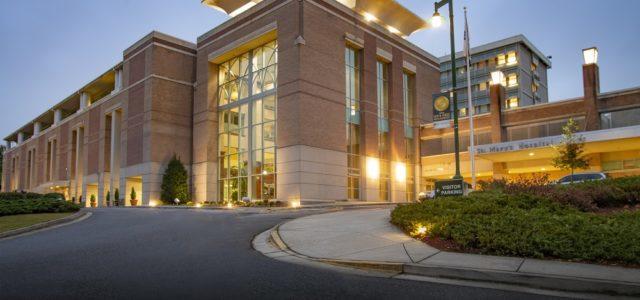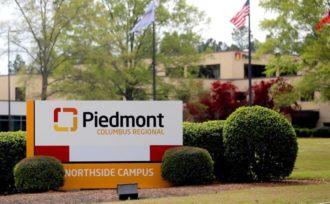
Section Branding
Header Content
Vaccine Mandates: Some Georgia Hospitals Move Ahead
Primary Content

The Piedmont Healthcare system will require doctors, hospital leaders and new employees to get vaccinated for COVID-19 by Sept. 1, the Atlanta-based nonprofit organization said Monday.
Other employees at Piedmont facilities will be required to get COVID shots “in the near future,’’ Piedmont said in a statement.
“It’s important to consider that vaccination is a leading factor in patients and team members feeling safe within a health care setting, as shown by research we conducted,’’ said the statement from Piedmont, a fast-growing system with 11 hospitals in the state. “Moreover, it is in keeping with our peers from other leading health systems throughout the United States.’’

While Piedmont’s size and geographic reach magnify the impact of its decision, it is not the first system operating in Georgia to take the step of requiring employee immunizations.
Last week, Trinity Health announced that employees at its 91 hospitals would be required to be vaccinated. And Trinity, a Michigan-based Catholic health care system, has three hospitals in Georgia.
Workers at the three facilities, St. Mary’s Hospital in Athens, St. Mary’s Good Samaritan in Greensboro and St. Mary’s Sacred Heart Hospital in Lavonia, will face the mandate to get COVID shots. The requirement also applies to St. Mary’s medical staff offices and outpatient facilities.
The Piedmont and St. Mary’s moves appear to be the first such announced worker vaccine requirements at Georgia hospitals, industry officials say.
The majority of St. Mary’s employees are already vaccinated, Dr. Jason Smith, chief medical officer of St. Mary’s Health Care System, said in a statement Monday.
“For those who are not vaccinated, we are holding town halls, team huddles and answering questions to address their concerns,’’ Smith said. “The majority of our colleagues and providers are supportive. We want those who are concerned to know we are listening but also that getting vaccinated is safe, effective and the right thing to do to protect the safety of our patients and our communities.’’
Trinity Health announced the policy last week for its 117,000 employees nationwide in an effort “to stop the spread of the virus and keep all patients, colleagues and the broader communities safe.’’
Employees at Trinity Health must meet a series of rolling deadlines, with most locations requiring they submit proof of vaccination by Sept. 21.
The number of hospitals and health systems requiring COVID-19 vaccination for employees is growing. Here’s a recent list from Becker’s Hospital Review.
Hospitals nationally have begun to mandate the shots since a federal court rejected a lawsuit by employees who challenged the vaccination requirement at Houston Methodist Hospital in Texas.
More than 150 employees who did not comply with the Texas system’s vaccine mandate were fired or resigned.
“Exemptions are available for religious or health reasons and must be formally requested, documented and approved,’’ Trinity Health said in a press release last week. “Employees who do not meet criteria for exemption and fail to show proof of vaccination will face termination of employment.’’
Using persuasion if possible
Hospitals should require workers to get vaccinated for COVID, Dr. Mark Ebell of the University of Georgia College of Public Health told GHN recently. “It’s about protecting the patients,’’ he said. Ebell noted that hospitals’ legal right to compel employees to get flu shots has been recognized for some time.
Still, many hospitals here and across the nation lag in their rates of vaccinated workers, an investigation by WebMD, Medscape and Georgia Health News found. Several had more than half of their workers unvaccinated, federal health data show.
Some hospitals have hesitated out of fear that some workers will quit, which is a concern because there is already a widespread labor shortage.
And others may be waiting until the vaccines get full authorization from the FDA, Dr. Carlos del Rio, an Emory infectious disease expert, said last week on GPB’s Political Rewind. Once that approval comes, he said “I can see many health care systems will move on to mandating the vaccine.’’
The U.S. Food and Drug Administration granted emergency use authorization for the vaccines months ago. But the agency has not yet given them full approval. The review process that could lead to such approval has started for the Pfizer and Moderna vaccines.
Most workers have heard the message
Trinity Health estimates nearly 75% of its employees have already received at least one dose of the vaccine.
“We feel it is important that we take every step available to us to stop the spread and protect those around us — especially the most vulnerable in our communities who cannot be vaccinated, including young children and the more than 10 million people who are immunocompromised,” Trinity Health President and CEO Mike Slubowski said in a statement last week.
Dave Smith, a consultant with Kearny Street Management in suburban Atlanta, said Slubowski is a “really passionate CEO.’’
“It’s a great public image, to get everyone vaccinated,’’ Smith said. “At a hospital, you’d expect the employees to be vaccinated.’’ But he added that some hospital workers still are opposed to getting a flu vaccine.
Dr. Smith of St. Mary’s added Monday that the hospital leaderships wants employees to know “the vaccine is safe and effective and that they are valued. At the end of the day, it is our sacred duty to protect all those we serve by ensuring our providers and colleagues have the maximum possible protection against COVID-19 before the onset of cold weather.’’
This story comes to GPB through a reporting partnership with Georgia Health News

